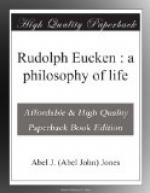This does not rob the term personality of its meaning, for each personality does, in some way, after all, exist for itself. Each individual consciousness has a sanctity of its own. But the being-for-self develops more and more by coming into direct contact with the Universal Spiritual Life.
Here, then, we arrive at something that appears to be a paradox. We have the phenomenon of a being that is free and existing for itself, yet in some way dependent upon an absolute spiritual life. We have, too, the phenomenon of a human being becoming divine. How is it really possible that self-activity can arise out of dependence? Eucken does not attempt to explain, but contends that an explanation cannot be arrived at through reasoning. We are forced to the conclusion, we realise through our life and action that this is the real state of affairs, and in this case the reality proves the possibility. “This primal phenomenon,” he says, “overflows all explanation. It has, as the fundamental condition of all spiritual life, a universal axiomatic character.” Again he says, “The wonder of wonders is the human made divine, through God’s superior power.” “The problem surpasses the capacity of the human reason.” For taking up this position, Eucken is sharply criticised by some writers.
When we approach the problem of the nature of the Absolute in itself, the main difficulty that arises is whether God is a personal being. God, says Eucken, is “an Absolute Spiritual Life in all its grandeur, above all the limitations of man and the world of experience—a Spiritual Life that has attained to a complete subsistence in itself, and at the same time to an encompassing of all reality.” The divine is for Eucken the ultimate spirituality that inspires the work of all spiritual personalities. When in our life of fight and action we need inspiration, we find “in the very depths of our own nature a reawakening, which is not a mere product of our activity, but a salvation straight from God.” God, then, is the ultimate spirituality which inspires the struggling personality, and gives to it a sense of unity and confidence. Eucken does not admit that God is a personality in the sense that we are, and deprecates all anthropomorphic conceptions of God as a personal being. Indeed, to avoid the tendency to such conceptions he would prefer the term “Godhead” to “God.” Further considerations of the nature of God can only lead to intellectual speculations. For an activistic philosophy, such as Eucken’s philosophy is, it would seem sufficient for life and action to know that all attempts at the ideal in life, originate in, and are inspired by, the Absolute Spiritual Life, that is by God.
We cannot discuss fully the relation of human and divine without, too, dealing with the ever urgent problem of religion. This is a problem in which Eucken is deeply interested, and concerning which he has written one of his greatest works—The Truth of Religion—a work that has been described as one of the greatest apologies for religion ever written.




